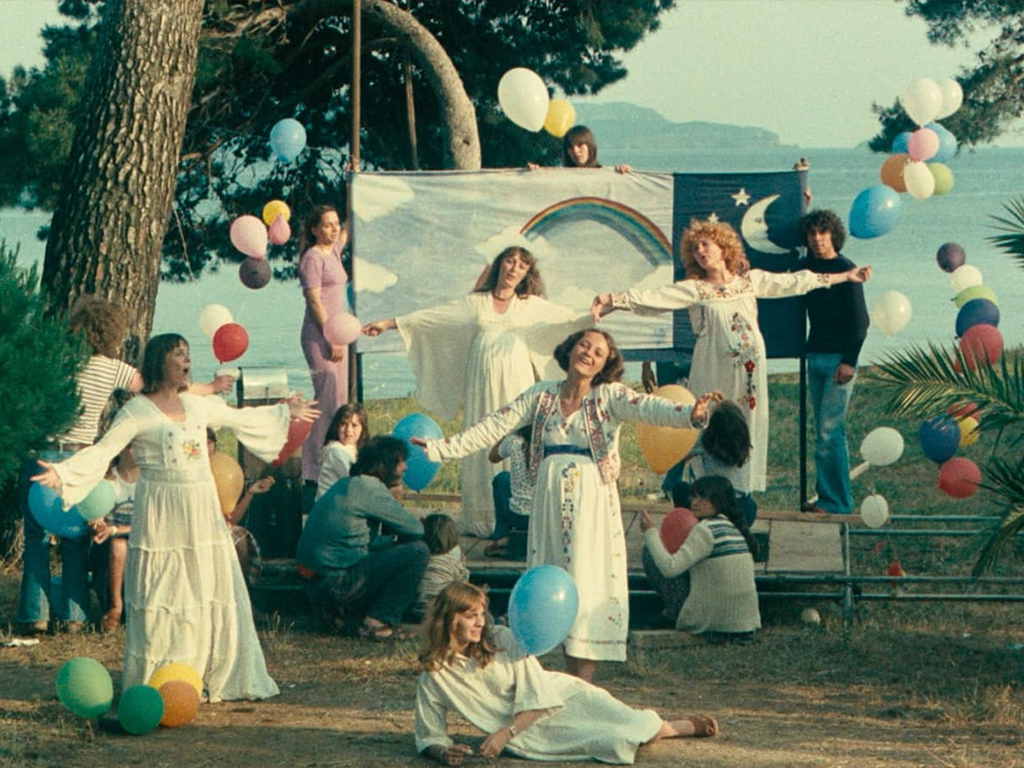Vibe:
"One Sings, the Other Doesn't" is a Disney-esque fairy tale musical, but with nudity, abortion, and suicide. At the time, it annoyed many critics who found it unrealistic or polarizing. Spoiler alert: most of those critics were men, although Pauline Kael was also not a fan. In her review for The New Yorker, she has some harsh words for Varda:
The sunshiny, masscult-hip simplicity of the feminist movement celebrated here is so laughable you can't hate the picture. You just feel that some of your brain cells have been knocked out.
Later, she compares the film's style to the "glamorous real-unreal quality of the new feminine-hygiene ads." Tbh, these are valid criticisms. Varda's film does look a little like propaganda at first glance, but to immediately dismiss it as shallow is stupid.
If you initially find yourself siding with Kael, I urge you to give this film a chance. If Pomme's (Valérie Mairesse) songs comparing pregnancy to balloons and cooing pigeons aren't your thing, focus on the quieter moments. While this film may seem to lay its cards right on the table, there's still plenty left unsaid and it's not all rainbows and cheerful feminism.
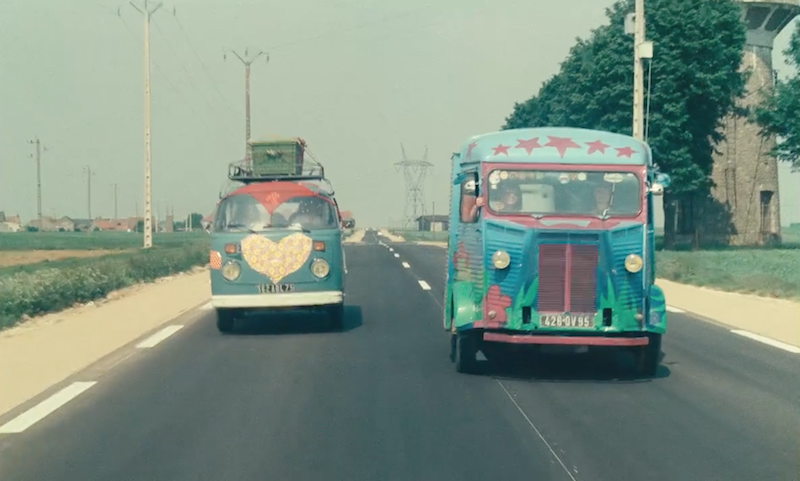
Best time to watch:
Watch this movie with a group of women, preferably one that enjoys Varda, feminism, and/or musicals. Go to the grocery store and buy a metric fuckton of Red Vines, Sour Patch Kids, and Junior Mints. Invite everyone to your house for a screening of "One Sings, the Other Doesn't" and "The Umbrellas of Cherbourg" (1964) by Jacques Demy, Varda's late husband. Get high on sugar and spend the night talking about beautiful, amazing women - both real (Varda, Catherine Deneuve) and fictional (Pomme, Suzanne, Geneviève).
Worst time to watch:
Do you ever have days where too much noise drives you crazy and other people's happiness makes you want to punch throats? If I was in one of those moods and decided to watch this movie, I'd probably find myself in complete agreement with Kael and other naysayers. I recommend you avoid it at all costs if you're nearing maximum grouchiness.
Where to watch:
The beautiful new 2K restoration is playing at BAM from June 1-7. If you're in the NYC area, please go see it! The new color-grading is spectacular (I received a screener) and Varda fans should jump at the chance to watch this film on a big screen.
If you're not in NYC, you can stream the unrestored version via the MUBI movie package on Amazon Prime.
Sidenote: if anyone is curious about what the film restoration process looks like, this video from Gizmodo gives a great overview.
Quick summary:
Pauline, aka Pomme, is seventeen years old and living with her parents when she wanders into a photographer's studio and sees photos of a girl named Suzanne (Thérèse Liotard) who she used to know but hasn't seen in awhile. She finds out that Suzanne has two children and is essentially the photographer's side piece (he is married to someone else). The two women strike up a friendship that is further solidified when Suzanne finds out she's pregnant with a third child and Pauline helps her pay for the abortion. "One Sings, the Other Doesn't" follows both women throughout the next 15+ years of their lives and chronicles their longstanding (platonic) love for one another.
Thoughts:
Although I find both protagonists slightly annoying, I love "One Sings, the Other Doesn't" for its blatant, unapologetic optimism. The world has never been kind to women and we've had to fight hard for even the most basic rights, like bodily autonomy. Even now, it's relatively easy for a man to have a bunch of kids and stay focused on his career. For women, it's more difficult because the system in place is there to dissuade us.
At the beginning of the film, when Pomme walks around Jérôme's (Robert Dadies) studio, she observes black and white photos of somber-looking women of all stripes - young, old, some pregnant or with children, many alone. Pomme notes that the women look sad, but Jérôme says it isn't his intention to make them that way. He likes these shots because they show women simply existing instead of posing and putting on a false exterior for the camera.
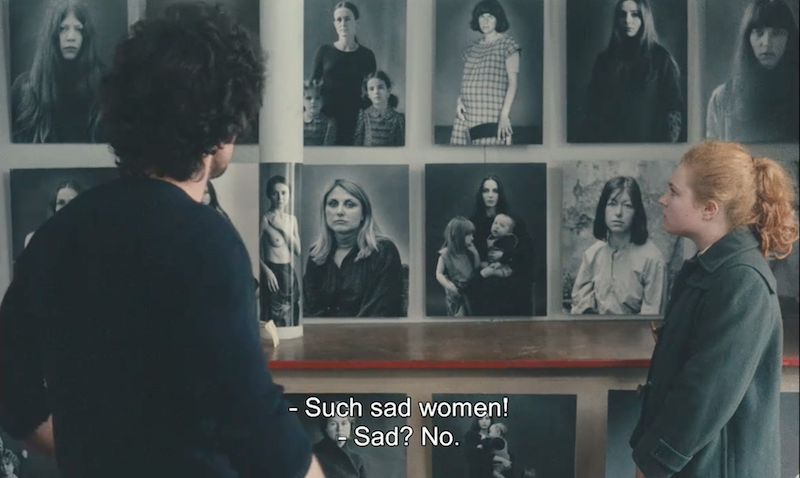
When Pomme sees Suzanne's photo, she and Jérôme have this exchange:
Pomme: That one with the kids ... I used to know her. We were neighbors 5 years ago. She got into trouble and disappeared. My folks put her down. I wanted to know her better. She was nice, but not sad like that.
Jérôme: My fault, maybe!
Pomme: You didn't flatter her, poor Suzanne. Where's she now?
Jérôme: With me. The kids're ours.
Jérôme is married to another woman and unable to offer Suzanne much financial or emotional support. At least he's self-aware enough to realize that he's likely the cause of her pain, but he still gives himself some wiggle room with "maybe."
We don't know much about Jérôme but based on our limited information, it seems that he's struggling with his masculinity and the responsibilities that come with it. He wants to be an artist, to take photos that are meaningful and also pay his bills. Unfortunately, things don't quite work out this way and he's forced to do other work (like developing film) in order to provide the money that his wife, mistress, and children need.
When Suzanne becomes pregnant for the third time, it's Pomme who gives her the money for an abortion, not Jérôme. Suzanne doesn't even initially tell him about the pregnancy because what difference will it make? He's barely involved with the children, has no money, and isn't exactly a comforting, emotionally available person.
It would be easy to write Jérôme off as an asshole who fucks around and doesn't properly care for his brood, but Varda doesn't do that and neither should we. Life is difficult and happiness is fleeting. Our actions have consequences and whether we like it or not, society assigns roles and responsibilities based on gender that are difficult to shake. Suzanne is the caregiver, Jérôme the provider. Neither are thrilled with this set up, but they soldier on until one of them breaks. Suzanne learns to find joy within the confines of her life as a single mother; Jérôme kills himself, ostensibly because he can't take another day of disappointing people.
For the first forty minutes, "One Sings, the Other Doesn't" is quite bleak. After Jérôme's death, Suzanne moves in with her horrible parents who live on a farm and constantly shame her for having children out of wedlock; Pomme rents a room in Paris and works as a singer/performance artist. The narrator (Varda) tells us that both women have been impacted by Jérôme's death.
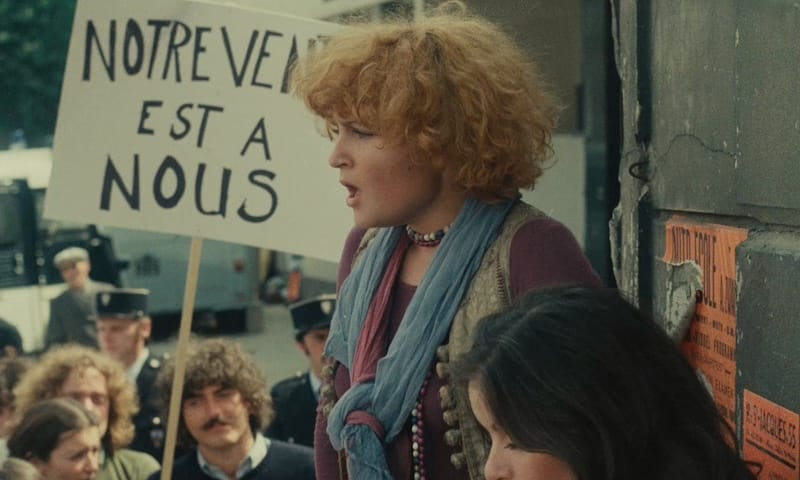
Ten years later in 1972, they meet again at an abortion-rights demonstration and rekindle their friendship. Pomme has a new boyfriend, Darius (Ali Rafie), and Suzanne works at a family planning center. They don't live in the same place anymore and can't see each other regularly, so they write letters and get together when possible. The rest of the film focuses on their separate stories and the way that their friendship and shared experiences bond them together forever.
Suzanne and Pomme have different passions, dreams, and personalities, but ultimately deal with the same struggles. With the help of each other and different communities of women, both find ways to get what they want out of life. Does this sound a little twee?
As someone with a more realistic (some might say pessimistic) outlook, I tend to approach the Suzannes and Pommes of the world with a heavy dose of skepticism. I firmly believe that no one is as happy as these women unless they're heavily medicated or blissfully naive about the horrors of the world.
When Pomme and Darius decide to end their relationship, there is some disagreement over who will get to keep Parviz, their newborn baby. Pomme suggests that Darius keep him and move back to Iran, but not until he impregnates her again because she also wants a child. This plan might sound okay on paper, but would never actually work IRL. If taken at face value, it's the type of plot line that might drive a viewer like me crazy. In the context of Varda's candy-colored feminist celebration, it somehow works.
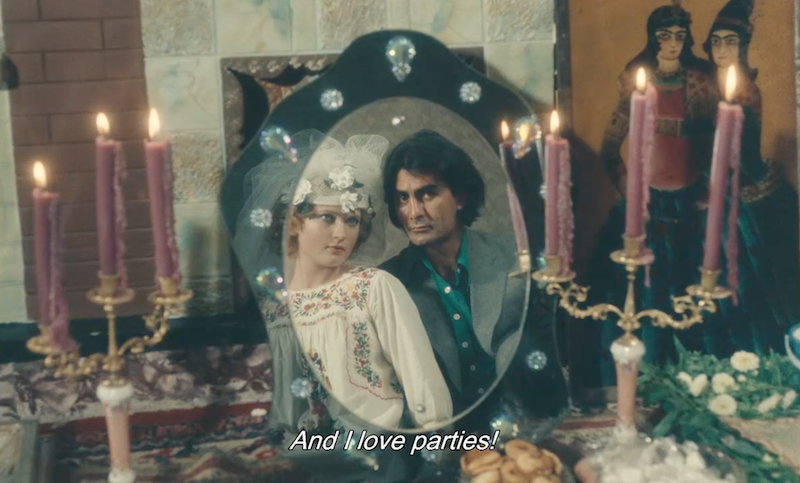
More often than not, the world is a shitty place and sadness/anger is the default reaction. It's easy to understand why the women hanging in Jérôme's studio don't want to smile. But life is too short to be sad all the time and I would never fault someone for finding a way to make it more palatable. If Pomme is able to enjoy a bohemian, single mom lifestyle while her baby daddy and first child are in Iran, more power to her. Why shouldn't she be happy? Her life belongs to her and that alone is worth celebrating.
Stray observations:
- Lying to your parents in order to obtain money for your friend's abortion and then getting kicked out of the house when your lie is revealed = very punk rock.
- I'm always surprised when I watch a Varda film and am reminded of Wes Anderson. I know Anderson has cited Varda as inspiration, but the two never really occupy the same space in my brain. The scene where Suzanne's son breaks his leg makes me think of the aftermath of Suzy Bishop's (Kara Hayward) lefty scissors attack.
- Penpals are underrated and this movie (along with the aforementioned "Moonrise Kingdom" (2012) proves it. I wonder if more people would send me letters if I switched back to a flip phone 🤔 ...
- Pomme reminds me of the parents from "Surfwise" (Pray, 2007). Parviz and little Suzanne will need thousands of dollars of therapy in order to become functioning adults.
- Both of Varda's kids are in this film. Mathieu Demy is Zorro and Rosalie Varda plays Marie at the end of the film.
- Here is a list of Pomme's cutest child nicknames: crab apple, dumpling, and little snowball. Beth Stern, please use these for your next trio of kittens.
- This definitely isn't my favorite Varda film, but it's somehow the first one I've written about. "Vagabond" (1985) and "Cléo from 5 to 7" (1962) are on my list.

